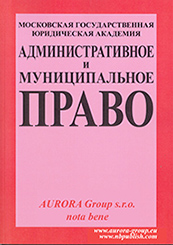Executive authorities and the civil society
Reference:
Grudtsyna, L.Y. (2014). Theory of convergence of private law and public law fundamentals within the aspect of civil society development. Administrative and municipal law, 6, 511–519. https://en.nbpublish.com/library_read_article.php?id=64979
Abstract:
Existence and development of the civil society cannot be imagined outside the complicated system of social
relations without direct or indirect participation of the government. One of the forms of such participation involves
adoption and application of norms of private and public law. The political system of the state also has its influence
upon the civil society, since the model of society development depends on a current quality of a political system. At the
first glance development of civil society takes place solely within the framework of private interests, but the participation
of public government and application of public law norms in the private law sphere (albeit indirectly) may not be
doubted. In the developed social systems public and private relations may be distinguished based upon the autonomy,
which is provided by the state for its citizens. The sphere of relations, which is provided by the state to the management
of the people, excluding direct involvement of the state, is regarded as being private relations. It does not mean,
however, that the state avoids necessary involvement in the private relations, but it is not dominant or predefining.
For example, in the sphere of religion the state proclaims the freedom of conscience. However, the state acts against
totalitarian and destructive sects, them being exclusively harmful for the society as a whole. Any legal norm providing
for private law fundamentals of social relations is public by its nature for the following reasons. Firstly, it is sanctioned
by the state and it becomes a part of national legislation. Secondly, it may not contradict or threaten the state system
and nature of state administration. Moreover, the private law and public law fundamentals are implemented in the
close interrelation with social, economic and cultural relations within the specific historical period, and they may not
be alienated from them. Therefore, the logic of their development is much dependent upon the economic situation,
defining specific developments of law and legislation, as well as of judicial practice and interpretation of laws. Economic
and cultural relations, which are regulated by the law do not fall exclusively within one of its spheres, and they
are included into the common object of both public and private law. The distinction between public and private law
based on interest or character of social relations, them not being either elements of legal norms or contents of a subjective
rights, is, therefore, not viable. For the sake of the study, firstly, there is need to consider Hegel’s view on civil
society as a sphere of private, singular interests, which in some situations has an independent value in comparison
with the sphere of public (common) interests. Secondly, the conclusion that differentiation between the civil society
and state (as a sphere of political power and administration apparatus) is based upon the individual rights of citizens, protecting them from abusive administrative intervention, and providing them with an opportunity to influence the
governing institutions (that is why, the individual rights should be regarded as an important element within the structure
of civil society). Thirdly, the reference to the possibility for an individual to achieve a goal only in relations with
others (that is in the presence of joint relations, serving as an inalienable element of civil society. Therefore, according
to the Hegel’s concept, the sphere of individual interests, law and solidarity are categories necessary for the description
of the civil society. The goal of civil peace supported by the state is protection of an individual citizen by the state.
A citizen is a natural unit or an atom (while citizenship involves a conventional element). On the other hands, members
or units (atoms) of the international order are states. However, as a matter of principle, the state may not be a natural
element, like an individual, since there are no natural borders of a state, they change and may only be defined via the
application of the international status quo principle, since this principle refers to a certain arbitrary date, so defining
the state borders is a purely conventional procedure.
Keywords:
state administration, civil society, private law, public law, state, human rights, business, economics, law, convergence of law.
 This work is licensed under a Creative Commons Attribution-NonCommercial 4.0 International License.
This work is licensed under a Creative Commons Attribution-NonCommercial 4.0 International License.
 Eng
Eng












 © 1998 – 2025 Nota Bene. Publishing Technologies. NB-Media Ltd.
© 1998 – 2025 Nota Bene. Publishing Technologies. NB-Media Ltd.




